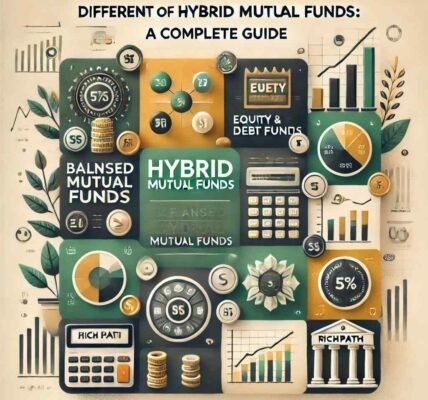Best Mutual Funds for Beginners in India: A Complete Guide
Investing in the best mutual funds is one of the easiest and most effective ways for beginners to start their wealth-building journey. With professional fund management, diversification, and accessibility, mutual funds are a preferred investment option in India. However, with thousands of funds available, choosing the best mutual funds can be overwhelming.
In this article, we’ll simplify mutual fund investing for beginners, explore key selection criteria, and highlight the best mutual funds for different investment goals.
Why Invest in the Best Mutual Funds?
1. Professional Management
The best mutual funds are managed by expert fund managers who analyze markets, select stocks, and adjust portfolios to maximize returns. Beginners benefit from this expertise without needing deep financial knowledge.
2. Diversification
Mutual funds invest across different sectors and asset classes, reducing overall risk. Even a small investment in the best mutual funds can provide exposure to a diversified portfolio.
Example: A ₹10,000 investment in a large-cap equity fund could be spread across 50–100 top Indian companies.
3. Accessibility and Low Investment Requirements
Many of the best mutual funds allow investment through Systematic Investment Plans (SIPs), starting at just ₹500 per month. This makes it easy for beginners to start investing with limited capital.
4. Liquidity and Flexibility
Except for closed-end funds and ELSS (tax-saving funds with a three-year lock-in), most mutual funds offer easy redemption, making them highly liquid.
How to Select the Best Mutual Funds
1. Define Your Financial Goals
Are you investing for long-term wealth creation, short-term gains, or tax savings? Your goal will determine which mutual fund category suits you best.
2. Assess Risk Tolerance
Risk varies across different mutual fund types. Beginners with low-risk tolerance should start with hybrid or debt funds, while those comfortable with market fluctuations can consider equity funds.
3. Analyze Fund Performance
Choose best mutual funds with a strong track record over 3–5 years. Look for consistency rather than just recent high returns.
4. Consider Expense Ratio
Lower expense ratios mean more of your money is invested in growing wealth. The best mutual funds maintain a balance between performance and cost efficiency.
5. Check the Fund Manager’s Experience
A skilled fund manager plays a crucial role in delivering returns. Research their past performance before selecting a fund.
Types of Best Mutual Funds for Beginners
1. Equity Mutual Funds – High Growth Potential
Equity funds invest primarily in stocks and are best for long-term goals.
Best Mutual Funds in Equity Category:
- SBI Bluechip Fund (Large-Cap) – Invests in stable, well-established companies.
- Mirae Asset Emerging Bluechip Fund (Large & Mid-Cap) – Balances safety and growth potential.
2. Debt Mutual Funds – Low Risk, Stable Returns
Debt funds invest in fixed-income securities like government bonds. Suitable for conservative investors.
Best Mutual Funds in Debt Category:
- HDFC Short Term Debt Fund – Offers stable returns with low risk.
- ICICI Prudential Liquid Fund – Ideal for parking emergency funds.
3. Hybrid Mutual Funds – Balanced Approach
Hybrid funds combine equity and debt, reducing volatility while ensuring steady growth.
Best Mutual Funds in Hybrid Category:
- ICICI Prudential Balanced Advantage Fund – Dynamically adjusts equity and debt exposure.
- HDFC Hybrid Equity Fund – Ideal for moderate risk-takers.
4. ELSS (Equity-Linked Savings Scheme) – Tax Saving + Growth
ELSS funds offer tax benefits under Section 80C with a three-year lock-in period.
Best Mutual Funds in ELSS Category:
- Axis Long Term Equity Fund – High-growth potential with tax benefits.
- Canara Robeco Equity Tax Saver Fund – Consistently strong performance.
5. Index Funds – Passive Investing at Low Cost
Index funds track a market index (e.g., Nifty 50) and require minimal monitoring.
Best Mutual Funds in Index Category:
- UTI Nifty Index Fund – Low-cost investment in the Nifty 50 companies.
- Nippon India Index Fund – Sensex Plan – Tracks the Sensex for stable, market-matching returns.
Best Mutual Funds for Different Goals
| Investment Goal | Recommended Mutual Fund | Category |
|---|---|---|
| Long-Term Wealth Creation | SBI Bluechip Fund | Large-Cap Equity |
| Tax Savings | Axis Long Term Equity Fund | ELSS |
| Low-Risk Investment | HDFC Short Term Debt Fund | Debt |
| Balanced Risk & Return | ICICI Prudential Balanced Advantage Fund | Hybrid |
| Passive Investing | UTI Nifty Index Fund | Index |
Mistakes to Avoid When Investing in the Best Mutual Funds
1. Chasing High Returns
Many investors pick funds solely based on past performance. Instead, focus on consistent long-term results.
2. Ignoring SIPs
SIPs ensure disciplined investing and reduce market timing risks. Always opt for SIPs in the best mutual funds for long-term wealth creation.
3. Not Reviewing Investments
Market conditions change. Reviewing your investments annually ensures your portfolio aligns with your goals.
4. Overlooking Expense Ratios
A high expense ratio can erode returns. The best mutual funds maintain low costs while delivering strong performance.
Conclusion
Investing in the best mutual funds is an effective way for beginners to achieve financial stability and long-term wealth growth. By selecting funds based on goals, risk appetite, and historical performance, investors can build a well-balanced portfolio.
The options listed above, from large-cap to hybrid and ELSS funds, serve as ideal choices for first-time investors. Start with SIPs, stay invested, and let compounding do the magic.
For expert financial insights, visit Rich Path. and start your investment journey today! 🚀
Read more –
Top 5 Mutual Funds for Long-Term Growth in India in 2025
Best Mutual Funds: How to Choose – A Complete Guide
Best Flexi Cap Mutual Funds to Invest in 2025
Disclaimer:
The information in this article is for educational purposes only and should not be considered financial advice. Mutual fund investments are subject to market risks, and past performance does not guarantee future returns. Please consult a certified financial advisor before making investment decisions.





9 COMMENTS